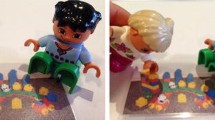Abstract
The purpose of this study was to compare mothers of normal, aggressive, and anxious-withdrawn preschoolers with regard to their beliefs about how socially competent behaviors are learned and their beliefs concerning the origins of two types of maladaptive behaviors-aggression and withdrawal. 121 mothers of 4- year olds were questioned about how they think social skills are acquired. They were also presented with descriptions of hypothetical incidents of peer-directed aggression and social withdrawal and asked what they would do about these behaviors, how they would feel about them, and how they would explain them. Children's social behaviors were observed during free play and rated by their teachers. A norm-based multitargeting procedure was used that resulted in the identification of 10 highly aggressive children, 6 highly withdrawn children, and 60 children who were average in social adaptation. Results indicated that mothers of withdrawn children were more likely than mothers of average children to believe that social skills should best be taught in a directive manner and that maladaptive behaviors should be responded to in a high-powered, coercive fashion. These mothers were also more likely than mothers of average children to indicate that they would feel guilty and embarrassed by displays of maladaptive behavior, and they attributed these behaviors to dispositional factors. Mothers of aggressive children suggested highly directive strategies to teach social skills, but were more laissez-faire than mothers of average and withdrawn children in their reactions to maladaptive behaviors.
Similar content being viewed by others
References
Baumrind, D. (1976). Child care practices anteceding three patterns of preschool behavior.Genetic Psychology Monographs, 75, 43–48.
Barrett, M., & Boggiano, A. K. (1988).Fostering extrinsic orientations: Use of reward strategies to motivate children.Journal of Social and Clinical Psychology, 6, 293–309.
Behar, L., & Stringfield, S. A. (1974). A behavior rating scale for the preschool child.Developmental Psychology, 10, 601–610.
Cohen, J. (1960). A coefficient of agreement for nominal scales.Educational and Psychological Measurement, 20, 37–46.
Elias, M., & Ubriaco, M. (1987). Linking parental beliefs to children's social competence: Toward a cognitive-behavioral assessment model. In R. Ashmore & D. Brodzinsky (Eds.),Thinking about the family: Views of parents and children. Hillside, NJ: Erlbaum.
Goodnow, J. J. (1988). Parents' ideas, actions, and feelings: Models and methods from developmental and social psychology.Child Development, 59, 286–320.
Hetherington, E. M., & Martin, B. (1986). Family factors and psychopathology in children. In H. C. Quay & J. S. Werry (Eds.),Psychopathological disorders of childhood (3rd ed., pp. 332–390). New York: Wiley.
Levy, D. M. (1943).Maternal overprotection. New York: Columbia University Press.
Maccoby, E. E., & Martin, J. A. (1983). Socialization in the context of the family: Parent-child interaction. In E. M. Hetherington (Ed.),Handbook of child psychology, Vol.4, Socialization, personality, and social development (pp. 1–102). New York: Wiley.
McGillicuddy-DeLisi, A. (1982). The relationship between parents' beliefs about development and family constellation, socio-economic status, and parents' teaching strategies. In L. M. Laosa & I. E. Sigel (Eds.),Families as learning environments for children (pp. 261–299). New York: Plenum.
Miller, S. A. (1988). Parents' beliefs about children's cognitive development.Child Development, 59, 259–285.
Mills, R. S. L., & Rubin, K. H. (1990). Parental beliefs about problematic social behaviors in early childhood.Child Development, 61, 138–151.
Moller, L. & Rubin, K. H. (1988). A psychrometric assessment of a two factor solution for the Preschool Behavior Questionnaire in mid-childhood.Journal of Applied Developmental Psychology, 9, 167–180.
Olweus, D. (1980). Familial and temperamental determinants of aggressive behavior in adolescent boys: A causal analysis.Development Psychology, 16, 644–666.
Parker, G. (1983).Parental overprotection: A risk factor in psychosocial development. New York: Grune & Stratton.
Patterson, G. R. (1982).Coercive family processes. Eugene, OR: Castilia Press.
Patterson, G. R. (1986). Maternal rejection: Determinant or product for deviant child behavior? In W. Hartup & Z. Rubin (Eds.),Relationships and development (pp. 73–94). Hillsdale, NJ: Erlbaum.
Pettit, G. S., & Bates, J. E. (1989). Family interaction patterns and children's behavior problems from infancy to 4 years.Developmental Psychology, 25, 413–420.
Rubin, K. H. (1982). Non-social play in preschoolers: Necessarily evil?Child Development, 53, 651–657.
Rubin, K. H. (1986). Play, peers and social development. In A. Gottfried & C. Caldwell Brown (Eds.),Play interactions: The contribution of play materials and parental involvement to child development (pp. 163–174). Lexington, MA: Heath.
Rubin, K. H., Mills, R. S. L., & Rose-Krasnor, L. (1989). Maternal beliefs and children's social competence. In B. Schneider, G. Attili, J. Nadel-Brulfert, & R. Weissberg (Eds.),Social competence in developmental perspective (pp. 313–331). Holland: Kluwer.
Author information
Authors and Affiliations
Additional information
The research described herein was supported by a grant from the Social Sciences and Humanities Research Council of Canada. Preparation of this manuscript was aided by a Killam Research Fellowship to author Rubin and by a Social Sciences and Humanities Research Council of Canada Postdoctoral Fellowship to author Mills. An earlier version of this manuscript was presented at the Biennial Meeting of the International Society for the Study of Behavioural Development, Jyvaskyla, Finland, July 1989. We would like to thank those parents, children and teachers in the Regional Municipality of Waterloo who helped make this study possible.
Rights and permissions
About this article
Cite this article
Rubin, K.H., Mills, R.S.L. Maternal beliefs about adaptive and maladaptive social behaviors in normal, aggressive, and withdrawn preschoolers. J Abnorm Child Psychol 18, 419–435 (1990). https://doi.org/10.1007/BF00917644
Revised:
Issue Date:
DOI: https://doi.org/10.1007/BF00917644



